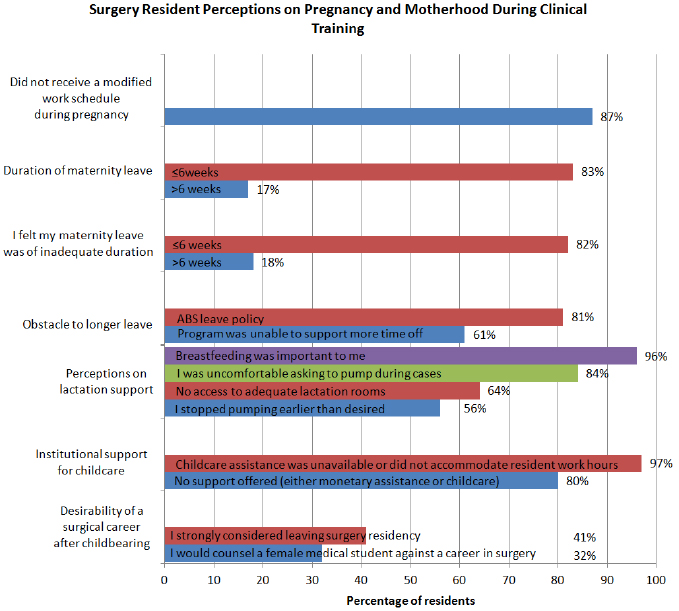Pregnancy and Motherhood During Surgical Training: Results of a Nationwide Survey of General Surgery Residents
Erika L. Rangel, *Marguerite Changala, *Manuel Castillo-Angeles, Douglas S. Smink, *Gifty Kwakye, *Adil H. Haider, Gerard M. Doherty
Brigham and Women's Hospital, Boston, MA
Objective: Although family priorities influence specialty selection and resident attrition, few studies describe resident perspectives on pregnancy during surgical training. The goal of this study was to directly assess the resident experience of childbearing and motherhood during training.
Design: 74-question survey distributed through the Association of Women Surgeons, the Association of Program Directors in Surgery, and targeted social media platforms.
Setting:Web-based survey
Participants: Female residents and practicing surgeons who had ≥1 child during clinical (non-research) training in a U.S. general surgery residency, graduating after 2007.
Interventions:None
Main Outcome Measures: Perceptions on work schedule during pregnancy, maternity leave duration and policies, lactation and childcare support, and the desirability of a surgical career after childbirth.
Results: 272 women met inclusion criteria. Most worked an unmodified schedule until birth and received ≤6 weeks’ maternity leave. 80% felt this was inadequate, citing the American Board of Surgery leave policy as a major barrier. Breastfeeding was important to nearly all, but 56% stopped earlier than desired due to poor access to lactation facilities and perceptions of stigma. Institutional support for childcare was inadequate for 97%. 43% strongly considered leaving surgical residency, and 32% would discourage female medical students from a surgical career, specifically due to difficulties of childbearing during training.
Conclusions: The challenges of having children during surgical residency may have significant workforce implications. A deeper understanding is critical to prevent attrition and continue recruiting talented students. This survey is an important step in characterizing these issues to help design interventions to support childbearing residents. 
Back to 2017 Program
